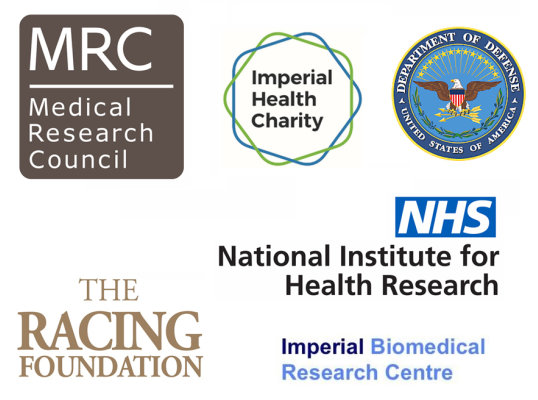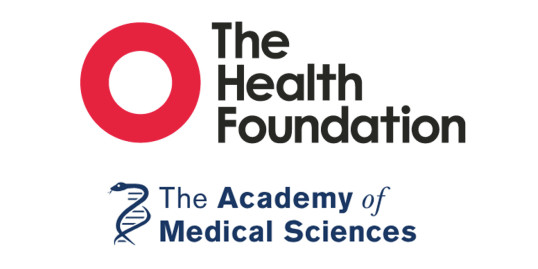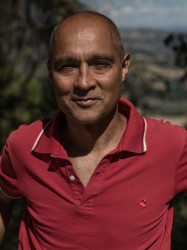Summary
SUMMARY
I am a neurologist expert in brain conditions that affect balance and spatial orientation and since Nov 2020 am head of the Centre for Vestibular Neurology at Imperial College London.
I am originally from Trinidad. I obtained my PhD in Vestibular Neurosciences from UCL (Institute of Neurology) at the MRC Human Movement and Balance Unit (supervised by Profs Gresty and Bronstein). My postdoctoral training at Imperial College was funded by an Academy of Medical Sciences and Health Foundation Clinician Scientist Fellowship. I am a Health Foundation Leadership alumnus.
ORCID: https://orcid.org/0000-0002-6578-0904
Personal professional webpage: https://seemungal.org/
Our research group combines sophisticated vestibular function testing and advanced brain imaging and neurophysiology to investigate the effect of brain disease upon vestibular function including balance, spatial orientation and self-motion perception.
National and international committees (guidelines, diagnostic criteria):
- President: British Society of Neuro-Otology (current)
- Co-chair: European Academy of Neurology Neuro-Otolo/ophthalmology Scientific Panel (current)
- Member: Association of British Neurologists TBI advisory group (current)
- Member: Royal College of Physicians Joint Clinical Neurosciences Committee (current)
- Member: UK National Institute for Health & Care Excellence committee for revising head injury guidelines (2022-2023)
- The Bárány Society
BRAIN AND VESTIBULAR GROUP team
Dr Sarah Hösli: Post-doctoral Clinical Researcher (Univ Hosp Zürich, Switz.)
Dr Matteo Ciocca: Consultant Mov't Disorder Neurologist & Doctoral Fellow
Dr Rebecca Smith: Senior physiotherapist & NIHR Clinical Research Fellow
Dr Solomiia Bandrivska: EAN Clinical Research Fellow
Mr Zaeem Hadi: Post-graduate Research Assistant
Ms Pauline Bourigault: Doctoral student, UKRI Centre for Doctoral training in AI for healthcare - Imperial College.
RECENT ALUMNI & ACTIVE COLLABORATORS
Dr Abdel Rahman Saad: Clinical Research Fellow
Dr Heiko Rust: Consultant Neurologist, Universitätsspital Basel, Switz.
current projects
PARKINSON'S DISEASE
1. An MRC-funded Clinical Academic Research Partnership (CARP) study with Dr Yen Tai, to trial the effect of spinal cord stimulation upon balance and falls in Parkinson's Disease patients. Recruiting.
1. JP Moulton Charitable Foundation grant with Dr Yen Tai to complement our MRC CARP. Recruiting.
TRAUMATIC BRAIN INJURY (TBI)
1. Univ of Brimimgham mTBI consortium to predict outcome (MoD funded). Initial stages of project.
2. An MRC-funded project (contact: Dr Calzolari) to assess the brain mechanisms of imbalance in TBI (MRC). Recently completed (see pubs for outputs).
3. A US Dep't of Defense project (contact: Dr Mahmud) - in collaboration with colleagues from the US (Mayo clinic) and Rome (Tor Vergata) - to assess the factors impairing recovery from mild TBI. Recruiting.
4. An NIHR Doctoral Fellowship (for Rebecca Smith) to assess the barriers to treating a common inner ear problem in TBI ('BPPV'). Recruitment completed, outputs in process.
ALZHEIMER'S DISEASE
1. Pilot study (local funding) in balance and spatial orientation in dementia patients (contact: Ms Mariya Chepisheva). Pilot completed.
DIAGNOSTICS
1. STROKE DIAGNOSTICS. Imperial Health Charity & AI4Health 'CDT' project to develop remote and automated 'AI' diagnosis of acute stroke with vertigo (ReActiVe study). On-going (contact: Pauline Bourigault).
2. CONCUSSION DIAGNOSTICS - A Racing Foundation-funded study to develop automated diagnostics for concussion detection (contacts: Ms Yuscah Pondeca and Mr Zaeem Hadi).
collaborators
- Prof Anil Bharath (Imperial): AI video diagnosis of stroke.
- Dr Caroline Burgess (Kings College London): Joint PhD student.
- Prof Danilo Mandic (Imperial): Remote concussion diagnosis & monitoring and joint PhD student (AI4Health CDT).
- Prof Jon Marsden (Univ of Plymouth): Joint PhD student.
- Prof James Rowe (Univ of Cambridge): Joint PhD student.
- Prof Simon Schultz (Imperial): Using information theory and non-invasive brain stimulation as a biomarker of functional motor cortex connectivity.
- Prof David Sharp (Imperial): MRC project (vestibular dysfynction in TBI).
- Prof Jeff Staab (Mayo Clinic): US Military mTBI & chronic vestibular disability
bio
Dr Seemungal was born and raised in Trinidad, West Indies and then studied medicine in Cardiff. Following general medical training in London, then three years as a specialist registrar in internal medicine and endocrinology in Oxford, he then trained as a neurologist in London. He completed a PhD in vestibular neurosciences - 'The Mechanisms and Loci of Vestibular Perception' - at the MRC Human Movement and Balance Unit (Institute of Neurology, Queen Square, London) under Profs Adolfo Bronstein and Michael Gresty. During his PhD, Dr Seemungal acquired expertise in all elements of vestibular neuroscience and laboratory techniques, including advanced neurophysiological techniques and non-invasive brain stimulation (with Prof John Rothwell).
Dr Seemungal was awarded a prestigious Health Foundation & Academy of Medical Sciences and Clinician Scientist Fellowship in 2008.
He enjoys teaching and training. In 2003, in his first year as a neurology trainee, he held the now historical post of Resident Medical Officer at the Hammersmith Hospital. More recently he has developed an interest in service delivery and led the development of a GP referral pathway for patients with diziness and imbalance for the North West London area (population 2.2 million).
He relaxes by playing football and going on outdoor holidays with his family. He has been a keen photographer since childhood and enjoys the visual arts.
VACANCIES
If you are interested in working with us, please contact Dr Seemungal (bmseem@ic.ac.uk).
CURRENT FUNDERS

Keywords: Vestibular Perception, Balance, Falls, Vertigo, TBI, Stroke, Dementia, Dopamine, Brain Imaging, Brain Stimulation.
Previous grant funding:

RESEARCH THEMES & diseases
THEMES
1. Higher-order mechanisms of vestibular-motion & vestibular-spatial perception.
2. Brain mechanisms of vestibular-mediated postural control.
3. Subcortical vestibular processing.
4. MR-guided focussed ultrasound & subcortical vestibular pathways.
5. Clinical automated diagnostics.
6. Drug, invasive & non-invasive electrical stimulation.
DISEASES
1. Vestibular neurology of traumatic brain injury.
2. Vestibular neurology of Parkinson's Disease.
3. Vestibular neurology of Alzheimer's Disease.
4. Stroke: remote and automated diagnosis.
5. Therapeutics: drugs, electrical stimulation (invasive & non-invasive).
-------------------------------------------------------------------------------------------------
PAST ORGANISED RESEARCH MEETINGS
fens satellite meeting, berlin july 12th 2018. progress in concussion research.
An overview of the latest research in concussion and mild traumatic brain injury.

FENS Satellite. Berlin, Germany 2018.
----------------------------------------------------------------------------------------
fens satellite meeting, como 3-4th july 2014. Brain Plasticity of the vestibular and ocular motior systems.

FENS Satellite. Como, Italy 2014.
A meeting focused upon brain plasticity in the vestibular & ocular motor systems.
SELECTED PUBLICATIONS
Calzolari E, et al., Sharp DJ, Seemungal BM. Vestibular agnosia in traumatic brain injury and its link to imbalance. Brain 2021;144(1):128-143. [OPEN ACCESS].
Smith R, et al., Burgess C, Marsden J, Seemungal BM. A mixed methods randomised feasibility trial investigating the management of benign paroxysmal positional vertigo in acute traumatic brain injury. BMC Pilot and Feasibility Studies 2020; 6:130. [OPEN ACCESS]
Yousif N, Fu RZ, Abou-El-Ela Bourquin B, Bhrugubanda V, Schultz SR, Seemungal BM. Dopamine Activation Preserves Visual Motion Perception Despite Noise Interference of Human V5/MT. J Neurosci. 2016 Sep 7;36(36):9303-12. [OPEN ACCESS].
Kaski D, Quadir S, Nigmatullina Y, Malhotra PA, Bronstein AM, Seemungal BM. Temporoparietal encoding of space and time during vestibular-guided orientation. Brain. 2016 Feb;139(Pt 2):392-403. [OPEN ACCESS].
Yousif N, Bhatt H, Bain PG, Nandi D, Seemungal BM. The effect of pedunculopontine nucleus deep brain stimulation on postural sway and vestibular perception. Eur J Neurol. 2016 Mar;23(3):668-70. [OPEN ACCESS]
Nigmatullina Y, Hellyer PJ, Nachev P, Sharp DJ, Seemungal BM. The neuroanatomical correlates of training-related perceptuo-reflex uncoupling in dancers. Cereb Cortex. 2015;25:554-62. [OPEN ACCESS].
Seemungal BM, Guzman-Lopez J, Arshad Q, Schultz SR, Walsh V, Yousif N. Vestibular activation differentially modulates human early visual cortex and V5/MT excitability and response entropy. Cereb Cortex. 2013 Jan;23(1):12-9. [OPEN ACCESS].
Seemungal BM. The cognitive neurology of the vestibular system. Curr Opin Neurol. 2014 Feb;27(1):125-32.
(Consensus paper) Lempert T, Olesen J, Furman J, Waterston J, Seemungal B, Carey J, Bisdorff A, Versino M, Evers S, Newman-Toker D. Vestibular migraine: diagnostic criteria. J Vestib Res. 2012;22(4):167-72. [OPEN ACCESS].
PRESS
http://www.bbc.co.uk/news/entertainment-arts-24295974
http://www.bbc.co.uk/news/entertainment-arts-24309704
http://www.abc.net.au/science/articles/2013/09/27/3857716.htm
http://www.itv.com/news/update/2013-09-27/scientists-crack-ballet-dancers-lack-of-dizziness/
Selected Publications
Journal Articles
Calzolari E, Chepisheva M, Smith RM, et al., 2021, Vestibular agnosia in traumatic brain injury and its link to imbalance., Brain, Vol:144, Pages:128-143
Kaski D, Quadir S, Nigmatullina Y, et al., 2015, Temporoparietal encoding of space and time during vestibular-guided orientation, Brain, Vol:139, ISSN:0006-8950, Pages:392-403
Nigmatullina Y, Hellyer PJ, Nachev P, et al., 2013, The Neuroanatomical Correlates of Training-Related Perceptuo-Reflex Uncoupling in Dancers, Cerebral Cortex, Vol:25, Pages:554-562
Seemungal BM, Guzman-Lopez J, Arshad Q, et al., 2012, Vestibular Activation Differentially Modulates Excitability and Response Entropy in Human V5/MT and Early Visual Cortex., Cerebral Cortex, Vol:23, ISSN:1047-3211, Pages:12-19
Guzman-Lopez J, Silvanto J, Seemungal BM, 2011, Visual motion adaptation increasesthe susceptibility of area V5/MT to phosphene induction by transcranial magnetic stimulation, Clinical Neurophysiology
Seemungal BM, 2007, Neuro-otological emergencies, Current Opinion in Neurology, Vol:20, ISSN:1350-7540, Pages:32-39

